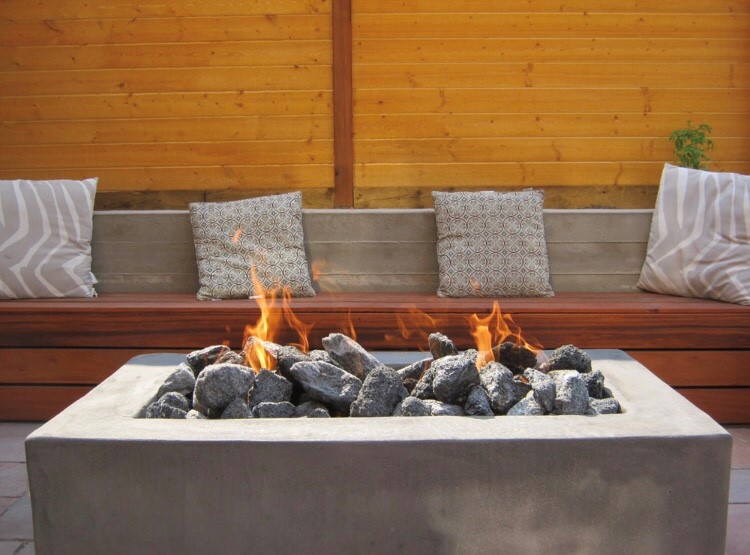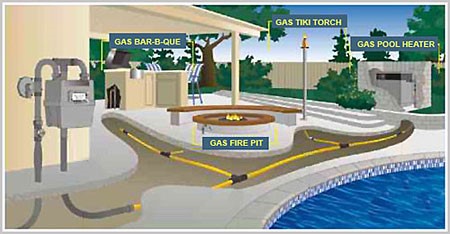I need a residential gas line installed, where do I begin?
When considering residential gas line installation, knowing the benefits of safe and efficient use of natural gas for your home is a good start. Most likely, your home’s heating system and water heater are already utilizing natural gas as its energy source. Using natural gas for other appliances, such as a grill, dryer, range, fire pit, etc., is a wise decision. Utilizing natural gas will not only be less expensive to operate but will let you enjoy the gas appliances that have less maintenance and last longer.

With the decision made to purchase a gas appliance, now you will have to choose a gas line installer. Make sure to decide on one who is insured, will pull a permit, is licensed to perform the work and specializes in the installation of gas lines. Many companies may have a license that covers residential gas line installation because they are licensed to do plumbing or some other trade, but that doesn’t mean they specialize in gas line connections.
You’re probably asking yourself, how are you supposed to know all of that so that you can make an informed decision? Well, I’m glad you asked since there is a critical checklist that will help you have a safer, properly sized gas line. By following this checklist, it will not only be up to code with your local jurisdiction but will ensure your gas appliance operates at peak performance.
Home Installation | First Steps
It all starts with a professional who knows gas line sizing, pressure drops, BTU content, and your utility service pressure. If you want your gas appliance to perform reliably and efficiently for years to come, then the residential gas line needs to be right.
A load calculation of your home’s gas appliances is the starting point. That will determine if a new gas line is needed or if the existing sizing is adequate. This formula takes into account the longest length method along with the total CFH (Cubic feet per hour). Then, using the National Fuel Gas Code (NFGC) charts will determine the best delivery system for your home and appliances. Don’t worry, this should all be taken into account by the professional you will hire, or will it?
Common Mistakes
Keep in mind that most residential gas line installation’s are not sized properly even by those who are licensed to install. That is because they simply don’t know or remember how to calculate the delivery pressure and volume. This is especially true if you live in higher elevations like Colorado. The BTU content of every Cubic Foot of Gas has about 20% less methane than those living at sea level.
What that means is your natural gas was intentionally set up to give you less energy at high altitude, that is because there is about 20% less oxygen in the air, and for your gas appliance to not have to be re-orificed at higher elevations, you simply get less energy. It’s kind of like buying the cheaper gasoline at the pump for your car, even though the premium will provide a higher Mile per gallon (MPG) average.
We have established that a specialized professional is needed. Now, let’s concern ourselves with what we can discover that will affect the desired outcome of our project.
Residential Gas Line Installation | Licensing

We know that it doesn’t matter how great a product or service is if the residential gas line installation is subpar, so what should you look for in a company and their installers?
Every contractor must hold the proper license for your jurisdiction and for the scope of work on your project. Then they must be insured, which means they should provide you with a current insurance certificate. Do your homework and check reviews. Call your local jurisdiction, and verify they hold the proper license and how long they have been licensed. Check with the Secretary of State (online) to see if their company is in “good standing”.
Now that you have checked out the contractor, how about their installers? What training have they had with gas pipe installations? Do they individually hold licenses or certifications, ensuring they are qualified for the task? They call this OQ Certified or Operator Qualified, which is a standard that few companies and individuals have achieved.
Being OQ Certified means each individual working at your home has at least the same qualifications & certifications that your local utility company has. On top of that, it also qualifies individuals to work on government projects. Along with the training, testing, and evaluations, there is also a stringent standard that involves background checks and drug testing.
Denver Natural Gas Experts
Does adhering to all this mean you will have a trouble-free project? No, there are no guarantees, but wouldn’t you rather have a company like The Gas Connection that has installed, replaced or serviced over 300,000 gas lines? For over 39 years we have the reputation of being the industry leader in gas lines for residential and commercial. You can be sure your gas line will be both safe and cost-effective.
The crews at TGC hold the necessary certifications and install in two weeks what most companies do in a year. Yes, we are licensed in the Denver Metro area, along the front range and in many mountain communities.
We would encourage you to not just take our word for it but look at our hundreds of reviews. Each will tell you they would trust The Gas Connection when it comes to family and home safety.